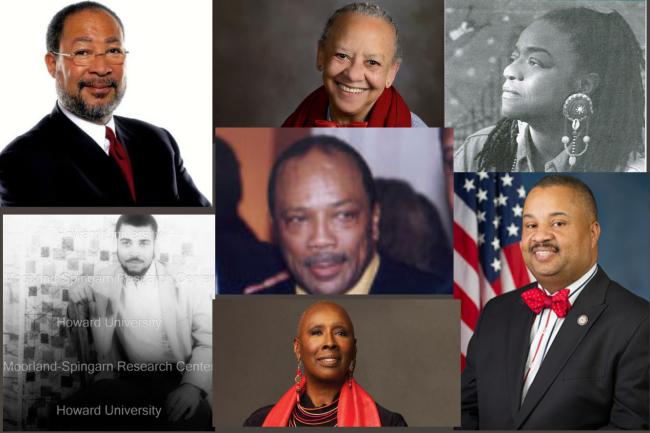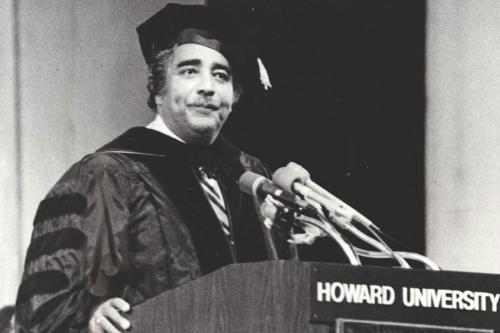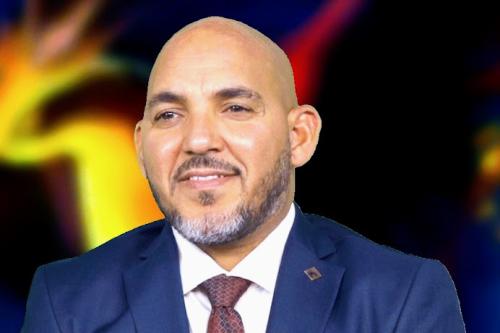Every new year we reflect on what the previous year gave us, as well as what it took away. Unfortunately, those losses sometimes include members of our own families, as well as those we consider family. In 2024, we lost several influential and dynamic members of the Black community. Whether we let them into our lives via television, movies, film or music, or we admired their business acumen or contributions to literature, we felt like we knew them, because in a way, we did. Here we remember just a few members of our family who touched Howard University in a special way.
Richard D. Parsons – CEO Time Warner (April 4, 1948 – December 26, 2024)
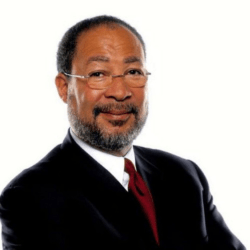
Described as a “Visionary leader, philanthropist, and steadfast champion of excellence” by Howard staff in a post celebrating his legacy and dedication to the university, Richard D. Parsons, Esq. served as a Howard University Board of Trustees member from 1998 to 2010 and Trustee Emeritus. His illustrious career included serving as chairman of Citigroup from 2009-2021 (and board member since 1996), as well as chairman and CEO of Time Warner, Inc., joining the company 1995, after serving as chairman and CEO of Dime Bancorp Inc. In addition to stints as interim CEO of the Los Angeles Clippers and the National Basketball Association in 2014, he was also a senior advisor at Providence Equity Partners and a longtime board member of financial services company Lazard as well as Estée Lauder. Outside of the business world, his commitment to the arts community was also notable. For example, he acted as Chairman of both the Apollo Theatre Foundation and the Jazz Foundation of America and served on the boards of the Museum of Modem Art and the American Museum of Natural History. In addition, President Obama named Parsons as a member of his then President-Elect Economic Transition Team in 2008.
Considered one of Corporate America’s most prominent Black executives, the roles and institutions for which he served listed here are just a few. Parsons’ influence was evident not only in the boardroom, but within government spaces and through his community advocacy.
In a 2007 New York Times interview Parsons said, “I want my legacy to be simple: I left the place in good shape and in good hands.”
Nikki Giovanni – Poet, Author & Activist (June 7, 1943 – December 9, 2024)
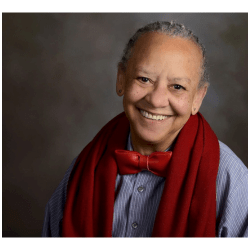
One of America’s best-known Black poets, Nikki Giovanni was a prolific writer, activist, and educator whose words and works touched the community and students across the country and beyond. An honorary member of Delta Sigma Theta Sorority, Inc., founded on the campus of Howard University in 1913, Giovanni was a University Distinguished Professor at Virginia Tech (retiring after 35 years on faculty in 2022). Howard students had the opportunity to hear her on numerous occasions on campus. In a post labeled “A Love Letter for Nikki” by Howard alumna and author of Breath by Breath: A Journey of Yoga & Loss, Julie Holly credits Giovanni for “initiating” her into the culture of Howard University, recalling a time during her freshman year when she heard the poet speak on campus about her work fighting for the rights of Black people; Black women in particular. This is but one anecdotal story of the way the author of more than 30 books and recipient of 31 honorary degrees impacted aspiring writers and artists for generations. In her self-written biography on Nikki-Giovanni.com, the then 71-year-old poet wrote she was “very very proud” of her seven NAACP awards, Grammy nomination, being named a National Book Award finalist, and authoring three New York Times and Los Angeles Times Best Sellers, calling the honors “highly unusual for a poet.” It seems like business as usual to those inspired by her work, work that brought her self-proclaimed happiness. “I like to cook, travel and dream. I’m a writer. I’m happy.”
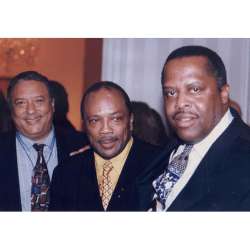
Quincy Jones (D.Mus. '85) – Legendary Producer (March 14, 1933 – November 3, 2024)
To call record producer, songwriter, composer, arranger, and performer Quincy Jones a legend seems a bit inadequate. Spotify called him a “renaissance man of American music” in its artist profile containing his greatest hits, compilations and more (and boasts 2,127,271 monthly listeners), which seems a bit more appropriate for a 80-time Grammy Award nominee and 28-time winner who produced masterful albums for the likes of Michael Jackson and worked with everyone from Frank Sinatra to Diana Ross and Aretha Franklin. An avid supporter of music and the arts throughout his eight-decade-long career, Jones was also a social activist who was a founder of the Institute for Black American Music (IBAM), which raised money to create a national library of African American art and music. He was also one of the founders of the Black Arts Festival in his hometown of Chicago, and Jones even launched his own nonprofit, Quincy Jones Listen Up Foundation, in 2001. The foundation built over 100 homes in South Africa and worked to give young people access to technology, education, music, and more. He also served on the Legal Defense Fund (LDF) board of directors for over 30 years, the civil rights law organization founded in 1940.
Jones received his flowers via many awards and honors, including being honored by the Kennedy Center in 2001, inducted into the Rock & Roll Hall of Fame in 2013, and receiving and honorary posthumous Oscar in in November of 2024. He was also notably awarded an honorary Doctor of Music in 1985 from Howard University; and was a recipient of the defense fund’s Thurgood Marshall Lifetime Achievement award in 1996, named for one of Howard’s most notable alumni.
It would take many pages to detail all he did to elevate the arts and black culture through his activism and use of his platform, not to mention highlight his impact on the music, television, and films that in many ways defined their times. That said, this special PBS NewsHour video does a good job summing up several of the high notes.
Judith Jamison (D.H. ’02) – Acclaimed Dancer and Choreographer (May 10, 1943 – November 9, 2024)
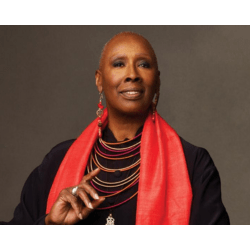
Beginning her educational studies at Fisk University at the age of 17, Judith Jamison would eventually transfer to the Philadelphia Dance Academy (now known as the University of the Arts), marking the beginning of what would be a brilliant career. In 1964 she performed with the American Ballet Theatre in New York city and later auditioned for choreographer, dancer, teacher, writer, and director, Donald McKayle. It was following this audition that a friend of McKayle, Alvin Ailey, invited a then 22-year-old Jamison to join his company. A member of Alvin Ailey American Dance Theater from 1965-1980, Jamison became its artistic director in 1989, a position she held until 2011.
The New York Public Library wrote that Jamison was a “global star who helped shape modern dance,” celebrated not only for her groundbreaking career, but her stewardship of the Alvin Ailey American Dance Theater—making it one of the most successful dance companies in the United States. Though she was a featured performer in many of its productions including Cry, which was choreographed for her by Ailey himself, Jamison also performed on Broadway and taught her own classes via The Jamison Project, which she formed in 1988.
Awarded an honorary doctorate from Howard University in 20o2, Jamison was the recipient of many awards and honorary degrees. Awards include the Kennedy Center Honors received in 1999, the National Medal of Arts in 2001, and the Handel Medallion (New York’s highest cultural honor) in 2010. She was also inducted into Delta Sigma Theta Sorority, Inc., as an honorary member in 1992.
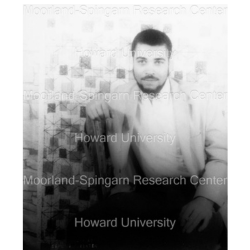
James Earl Jones (January 17, 1931 – September 9, 2024)
One of the most recognizable figures— and voices—of American cinema and culture is that of James Earl Jones. The actor was a pioneer, with a range of work that included stage and screen, as well as voice-work that became a part of the very fabric of pop culture. He voiced Mufasa in The Lion King and Darth Vader in Star Wars. Starred in critically acclaimed films like Coming to America and Field of Dreams; and began his decades-spanning career in theatre. Jones made his Broadway debut in Sunrise at Campobello in 1957, and his roles with Shakespeare in the Park, including Othello, Hamlet, and King Lear, were critically acclaimed. There are many other plays, films, voice work, and art that were elevated by the EGOT winner (one of only 27 to have won an Emmy, Grammy, Oscar, and Tony). There are also likely many stories to be told from those inspired by not only his work, but by the man himself. One is shared here.
In 1968, Jones won the Tony Award for his portrayal of a boxer in The Great White Hope. It was during this time period that Howard alumna and Chadwick A. Boseman College of Fine Arts Dean Emeritus Phylicia Rashard (B.F.A. ’70) first came into contact with the legend in the making. In an essay on American Theatre, Rashad recalled a spring day as a sophomore at Howard when she heard students exclaiming “He’s here!” and “Did you see him” in reference to the actor being on campus. Noting that Jones had taken time out of his busy theatre schedule to “visit this historic institution of higher learning;” Rashard reflected on that visit, as well as another time she spoke with him backstage after a Broadway production of Lorraine Hansberry’s Les Blancs. It’s hard to imagine she knew then that she’d eventually share the stage with Jones 30 years later in Cat on a Hot Tin Roof.
“Playing Big Mama opposite his Big Daddy, under the direction of my sister, Debbie Allen Nixon, had been beyond my dreams,” she wrote of performing with Jones in her sister’s, also a Howard alumna, debut as a director on Broadway. Affirming him a legend, Rashad emphasized his iconic status, saying though it was “well deserved by virtue of decades of sustained excellence in performance onstage, in film, and on television,” he was a genuine person first. “Being with Mr. Jones was easy because of his genuine interest in each person that he met. He was present, kind, and accessible,” she wrote.
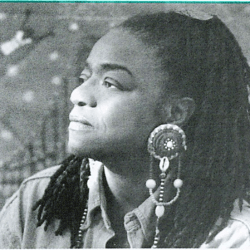
Faith Ringgold – American scholar, artist, poet and activist (October 8, 1930 – April 13, 2024)
Faith Ringgold was an American painter, author, mixed media sculptor, performance artist, and intersectional activist, known nationally for her narrative quilts. Born in Harlem, New York City, Ringgold earned both her bachelor's and master's degrees from the City College of New York. Her work has graced the walls of great institutions across the world, including the Metropolitan Museum of Art, the Guggenheim Museum, the Schomburg Center for Research in Black Culture, and the Philadelphia Museum of Art.
The 1960s shaped the beginning of Ringgold’s career, being a time of social and civil activism, especially within the arts. Her first political painting, the American People Series (1963-1967), included works titled “The Flag is Bleeding,” for example, and portrayed the American lifestyle in that moment. Many of her paintings were influenced by artists like Jacob Lawrence and writers of the time like James Baldwin and LeRoi Jones (Amiri Baraka). Quilts and textiles became her canvas in later years, and she was also an acclaimed sculptor, writer, and performance artist. Upon her passing at 93 years old, The New York Times said Ringgold “wove black life into quilts and children’s books,” calling her a champion of Black artists who “explored themes of race, gender, class, family, and community through a vast array of media.”
Ringgold was a professor at the University of California, San Diego, teaching art from 1987 until 2002, and according to her website the winner of 75 awards, including 22 Honorary Doctor of Fine Arts Degrees. In 2006, Howard University honored the artist with a James A Porter Colloquium on African American Art.
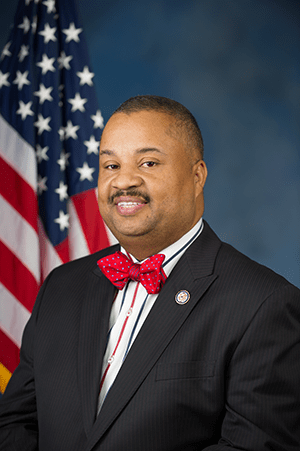
Donald M. Payne, Jr. - Politician, United States Representative (December 17, 1958 – April 24, 2024)
An American politician who served as a U.S. representative for New Jersey's 10th congressional district from 2012 until his death, Donald Payne Jr. and his family left a tangible mark on Howard University. Administered by the university, the Donald M. Payne International Development Graduate Fellowship Program, named after his father, former United States Representative Donald Payne Sr., supports students interested in pursuing careers in the Foreign Service of the U.S. Agency for International Development (USAID), and in 2023, Payne engaged directly with that year's fellowship cohort. In a message shared by Howard University President Ben Vinson III, Ph.D., he called Howard students an extension of Rep. Payne's family, stating that the Representative was "among the best in public service" and a "beacon of hope and a champion of justice for communities he served."
Though not an exhaustive list, the family listed here remind us all how connected we are by the works of others in the community. To know that so many greats touched or were touched by Howard University in some way is a source of pride for all those who walk this campus, and beyond.


